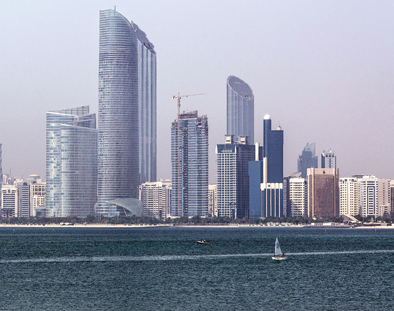Governments looking to diversify resource-dependent economies could do worse than consider the financial technology (fintech) industry. By the third quarter of 2016, total global funding for fintech companies had reached $17.8bn, according to figures from KPMG. This performance built on a record breaking investment figure for 2015, with a total of $19.1bn allocated to fintech groups.
Cumulatively, these numbers point to an industry that is experiencing a stellar growth story and one that is being driven for the most part by highly innovative and often disruptive startup enterprises.
Abu Dhabi takes note
The benefits that a healthy fintech ecosystem can bring – including an abundance of highly skilled workers and value-added contributions to an existing financial services industry – have not gone unnoticed in Abu Dhabi. The emirate’s financial centre, Abu Dhabi Global Market (ADGM), has established the region’s first fintech sandbox, known as the Regulatory Laboratory (RegLab), to develop a supportive framework tailored to the unique risks and requirements of fintech companies.
“In March 2016 we announced our ambitions to become a fintech hub for the Middle East and Africa. The fintech sector will only grow in importance in the coming years and we hope to mirror the success of other regional hubs, including Singapore for Asia and London for Europe,” says Richard Teng, chief executive officer of ADGM’s Financial Services Regulatory Authority.
Under the FSRA’s RegLab structure, participating entities will operate for two years under a specially devised framework that takes into account the technology being used and the risk profile and business model of the company. This structure not only shields fintech companies from exposure to the full suite of ADGM authorisation regulations but it addresses key concerns such as operational cost and time-to-market for participating entities.
“We set up RegLab because we wanted to establish a safe and controlled environment where these companies can test, develop and innovate their products and services before they are subject to full authorisation. It caters to different players in the fintech spectrum from start-ups to more established entities,” says Mr Teng.
RegLab, which was officially enacted in November 2016, is receiving applications until the end of January 2017 before selecting the first round of participating organisations. Strong interest is expected particularly from the wider Middle East and north Africa (MENA) region. Indeed, the authorities in Abu Dhabi are hoping to tap into a rising tide of fintech activity from Egypt to Lebanon to Saudi Arabia, which is positioning the region as one of the more exciting fintech markets globally.
Hitting the accelerator
Reflecting this regional trend, Barclays Bank Egypt established Egypt’s first fintech accelerator in partnership with Flat6Labs in early 2016, a regional start-up accelerator programme, to harness the potential of Cairo’s booming early-stage fintech companies. Similar accelerator and start-up seed programmes, run under the auspices of Flat6Labs, exist in Jeddah, Tunis, Beirut and Abu Dhabi.
"Flat6Labs has invested in about 100 companies [across the MENA region] over the past five years. We expect to invest in a further 60 to 80 companies in 2017. The start-up ecosystem in the MENA region is maturing quickly," says Victor Kiriakos, managing director of Flat6Labs Abu Dhabi.
For its part, ADGM’s financial services regulatory authority signed a partnership agreement with Flat6Labs in June 2016 to develop a fintech ecosystem in Abu Dhabi. "Our partnership with ADGM works well because it has developed a strong regulatory framework, while we are working with the banks and the wider financial ecosystem to raise awareness and really develop a fintech community,” says Mr Kiriakos.
Key to diversity
Though these are early days for Abu Dhabi’s fintech ambitions, the benefits of creating a healthy and functioning ecosystem sit well with its objective of economic diversification. Already boasting one of the region’s largest and most sophisticated banking markets – the merger of the National Bank of Abu Dhabi and FGB created the MENA region’s largest bank – the authorities are looking to the financial services sector to drive further economic reform.
“If you look at the value proposition of Abu Dhabi, it has the talent pool, the funds and the global connectivity to capitalise on trade and investment flows along the so-called east-west corridor. As Abu Dhabi continues to diversify away from oil wealth the financial sector has been identified as a key pillar of that strategy,” says Mr Teng.
Indeed a number of banks are moving quickly to invest in and engage with digital finance and fintech offerings. Abu Dhabi Islamic Bank (ADIB) has seen use of its digital channels skyrocket in recent years, leading to further investment in mobile applications and online offerings. More than 90% of the bank’s transactions are executed through digital channels, with the total volume of transactions conducted on the bank’s app growing by 50% in 2016 to more than 1 million per month.
ADIB has also established the region’s first community-based digital bank. “We are looking to boost our online customer engagement, especially among millennials, therefore, we are embarking on a transformational initiative – partnering with Germany’s Fidor Bank to launch the region’s first community-based digital bank,” says Tirad Al-Mahmoud, chief executive of Abu Dhabi Islamic Bank.
“The new online platform is designed to fit the lifestyle of millennials, providing full digital services, as well as a community for the exchange of views and information, particularly around personal finance matters from their peers as well as from experts from the finance industry. Through the community, members will have a say in the way we offer our products and solutions to them,” he adds.
This kind of forward-looking investment reflects the culture of Abu Dhabi’s innovative financial sector. Encouragingly, the advent of RegLab and efforts to develop a fully fledged fintech ecosystem have been broadly welcomed by the banks and the wider finance community, even if some are slower to embrace these changes than others.
“Banks in the UAE understand the need to engage with the fintech sector. Some are more nimble than others but things are moving in the right direction,” says Mr Kiriakos.
Falling angels?
But even though progress to date has been swift, the growth of the emirate’s fintech community will not be without its challenges. Though the authorities have worked hard to create a supportive, enabling environment through frameworks such as RegLab, various impediments to early-stage fintech start-ups remain. Most problematic of all is the culture of angel investors in the region, who are more familiar with traditional investment opportunities.
“The are a number of challenges facing start-ups in the UAE. One of them is the expense of opening a bank account and obtaining a business licence. Another is that angel investors tend to be more risk averse compared with other markets because they are less familiar with digitally focused companies,” says Mr Kiriakos.
Raising awareness among the investment community will be a crucial component of Abu Dhabi’s fintech strategy moving forward. “It will be important to highlight some of the new trends that fintech can deliver. We know the road ahead will be difficult but we welcome the challenge and we remain very encouraged by our progress so far,” says Mr Teng.
Beyond the investment community, Abu Dhabi is also looking to strike partnerships with regional and global regulators to develop bridges between different jurisdictions. The aim of this international co-operation is to help to develop a thriving global fintech ecosystem, of which Abu Dhabi will form a core hub by facilitating easier access to various markets for new and established fintech companies.
“What we are looking to do is build greater connectivity for the region. That includes developing relationships with regulators in the Middle East and Africa and beyond so that different expertise can be shared. We think we’re the logical partner for the Middle East and Africa,” says Mr Teng.












